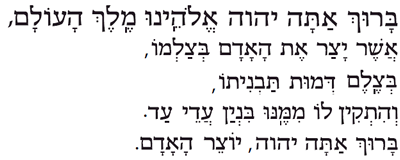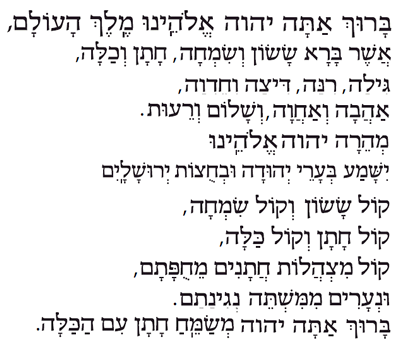|
Jewish Marriage and the Sheva Brachot
By Nachum Mohl
Perhaps one of the most noticeable differences between the Western culture's concept of marriage and the Jewish concept of marriage can be seen and highlighted by the tradition surrounding the week after the marriage. In most Western societies the bride and groom leave the wedding hall to begin their 'honeymoon' – this is a week or two holiday for them only at some interesting site where they stay in a hotel. The after-marriage of Jewish tradition is totally different. The bride and groom are invited out on a daily basis for a full week's celebration with festive meals with their families and their friends. The joy of the Jewish wedding continues for an entire week for every one.
The custom of seven days of wedding celebration is very old; it is mentioned in the Torah when Yaakov unknowingly marries Leah instead of her sister Rachel whom he desired and complains to Lavan, his father-in-law, that he was tricked and that he wants Rachel, his rightful wife for whom he worked for seven years. Lavan replies that he should finish the seven days of the wedding celebrations first and then he will give him Rachel. (Genesis 29:27) We see here that the seven days of wedding celebration is an ancient custom that existed even before the Torah was given!
Weddings are special times and the seven days of wedding celebrations are special too. In Jewish weddings it is not just the bride and groom that wed; it is both families. The two sets of in laws become 'wedded' also. There is a relationship that develops between the two families. The parents of the bride and groom become 'mechutanim'. This special name indicates that they are no longer two separate families, but rather they are bound together through their children's marriage and are considered now part of the extended family. It is during the time of the sheva brachot that the two sides to get to know each other and establish a long and lasting relationship.
For the Shevah Brachot, each night a different friend or relative makes a feast for the Chatan and his Kalla, (as the groom and bride are called in Hebrew). The families are invited to attend and the getting to know you process proceeds amidst the joyful celebrations. Each festive meal is attended by as many friends and family as can be accommodated and a minimum of ten men are required.
The meal is considered a seuda mitzvah, a meal of a mitzvah, since it is a mitzvah to make the Chatan and his Kallah happy. The meal starts by having bread, but the main dish could be a meat meal, a fish meal, a cheese meal or even a parve meal; what is important besides the good feelings generated is that the blessings for the Chatan and his Kallah are recited at the conclusion of the meal (as will soon be explained). Music can be played, songs should be sung, and even a bit of festive dancing is in order for these meals. Good conversations peppered with Torah and marriage insights are common.
It is customary to invite at least one guest, a friend or relative of the Chatan or Kalla who was unable to attend the wedding. In this manner the joy increases. At the end of the meal the traditional blessings are recited for the bread and at the conclusion of the blessings on the bread the seven special blessings are made for the Chatan and Kallah.
Before the blessings for the bread are made, a cup of wine is given to one of the men who begins the blessings for the meal. When he is concludes these blessings he puts down the cup and waits for the sheva brachot to begin. A second cup is filled up with wine and given to another man. It is on this second cup of wine that six of the seven special blessings are made for the Chatan and Kalla. Some have the custom that one person says all six blessings; other have the custom to divide the six blessings up between various guests. When these six blessings are finished, the man who began the blessings on the bread and the meal then recites the blessing “boreh perei ha-gofen” which is the last of the seven blessings.
This man will drink from the cup which he is holding, then take the other cup over which the six blessings were recited and mix the two cups together so that the blessings become intertwined. One cup is given to the chatan to drink from and the other is given to the kallah. Since these are cups of blessings it is the custom of those in attendance to take a small sip of the wine too.
Additional notes:
The sheva brachot are recited for seven days when either the bride or groom have not been previously married. When both the Chatan and Kalla have been previously married, the sheva brachot are recited at the first meal after the wedding only. The day of the wedding and the meal eaten there are considered as the first of the seven days and the sheva brachot are recited there too.
The following are the Seven Blessings: - Transliterated and Translated:
1. Baruch Ata Adonai, Elohainu Melech HaOlam, SheHakol Borah Lichvodo.
Blessed are You, G-d, our L-rd, King of the universe, Who has created everything for His glory.

2. Baruch Ata Adonai, Elohainu Melech HaOlam, Yotzer Ha'Adam
Blessed are You, G-d, our L-rd, King of the universe, Who fashioned the Man.

3. Baruch Ata Adonai, Elohainu Melech HaOlam, Asher Yatzar Et Ha'Adam Betzalmo, b'Tzelem Dmut Tavnito, VeHitkon Lo Mimenu Binyan Adei Ad. Baruch Ata Adonai Yotzer Ha'Adam
Blessed are You, G-d, our L-rd, King of the universe, Who fashioned the Man in His image, in the image of his likeness and prepared for him from himself a building for eternity. Blessed are You G-d, Who fashioned the man.

4. Sos Tasis VeTagel HaAkarah, BeKibbutz Bane'ha Letocha BeSimchaa. Baruch Ata Adonai, Mesame'ach Tzion BeVaneha
Bring intense joy and exultation to the barren one through the ingathering of her children amidst her in gladness. Blessed are You, G-d, Who gladdens Zion with her children.

5. Sameach TeSamach Re'im Ahuvim, KeSamechacha Yetzircha BeGan Eden MiKedem. Baruch Ata Adonai, MeSame'ach Chatan VeKalah
Gladden the beloved companions as You gladdened Your creatons in the garden of Eden from the earliest time. Blessed are You, G-d, Who gladdens groom and bride.

6. Baruch Ata Adonai, Elohainu Melech HaOlam, Asher Barah Sasson VeSimcha, Chatan VeKalah, Gila Rina, Ditza VeChedva, Ahava VeAchava, VeShalom VeRe'ut. MeHera Adonai Eloheinu Yishama BeArei Yehudah U'Vchutzot Yerushalayim, Kol Sasson V'eKol Simcha, Kol Chatan V'eKol Kalah, Kol Mitzhalot Chatanim MeChupatam, U'Nearim Mimishte Neginatam. Baruch Ata Adonai, MeSame'ach Chatan Im Hakalah.
Blessed are You, G-d, our L-rd, King of the universe, Who created joy and gladness, groom and bride, mirth, glad song, pleasure, delight, love, brotherhood, peace, and companionship. G-d, our L-rd, let there soon be heard in the cities of Judah and the streets of Jerusalem the sound of joy and the sound of gladness, the voice of the groom and the voice of the bride, the sound of the grooms' joy from their canopies and of the youths from their song-filled feasts. Blessed are You G-d Who gladdens the groom with the bride.

7. Baruch Ata Adonai, Elohainu Melech HaOlam, Boreh Pri HaGafen.
Blessed are You, G-d, our L-rd, the King of the universe, creator of the fruit of the vine.

Please feel free to print out this guide to use at your Sheva Brachot party and tell us how much you enjoyed it.
~~~~~~~
from the March 2010 Edition of the Jewish Magazine
|
